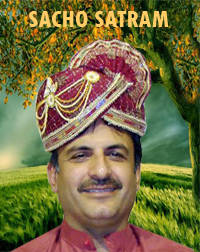In one of his soul-stirring and insightful Satsangs on the sacred occasion of Green Thursday, Hazir Swaroop Sai Sadhram Saheb beautifully explained that the true essence of this auspicious day is to keep ourselves evergreen—with genuine joy, radiating health, vitality, purity, simplicity, and prosperity, while continuously growing under the refuge of Shahanshah Satguru. He emphasized that life is a divine blessing, meant not only to bring true contentment in this lifetime but to enrich our souls for eternity.
We are rewarded according to our karmas. In this human life, we have the opportunity to create either good or bad karmas, and our present actions determine the rewards we receive. This birth is truly unique.
For instance, in Italy, an artist created ice statues and displayed them in an exhibition. Over time, the statues began to melt, their shapes gradually transforming into distorted and unrecognizable forms as their body parts dissolved.
This serves as a reminder that our life, too, is like those melting statues—it exists for a predetermined time and is continuously diminishing. With each passing day, we move closer to the inevitable end. Therefore, we must value our life and, before it fades away, strive to make it meaningful by engaging in actions that bring us eternal peace and spiritual progress.
The more we value our life, the more it will improve. Life is meant for action, not for merely waiting for things to happen.
We often have the habit of observing and judging others, yet we fail to reflect on ourselves and keep track of our own actions. Instead, we should focus on self-observation.
Each morning, as soon as we wake up, the first thing we should do is remember God and express our gratitude for being given another day. Many are not granted this blessing, and we must cherish the opportunity to witness a new day.
We should be grateful to God and reflect on the purpose of each new day in our life. Saijan emphasized that when we understand the purpose of something, more paths naturally open for us. Clarity of purpose paves the way for opportunities, guiding us toward its fulfillment.
Once we focus on our purpose, numerous ideas will arise to help us fulfill it. We may think of helping or uplifting someone, showing kindness, engaging in selfless seva, improving ourselves, or pursuing various meaningful goals through inspired ideas. However, having a clear purpose is essential—when we are aware of it, we can make our day truly valuable.
We must not simply wait for things to happen; instead, we must take action and put in the effort to achieve something. Life is meant for purposeful action, not just passive observation.
Just as cultivating a field requires preparation, so does shaping our life. If we wish to grow something on a piece of land, we first dig the soil, clear out waste, and remove any unnecessary or decayed grass. We then sow seeds, and as they begin to sprout, we notice that along with the intended crop, unwanted weeds also grow. These weeds serve no purpose and must be removed so that the useful crop can thrive. Similarly, in life, we must discern what is valuable and eliminate what hinders our growth.
The more we care for our crops, the better the outcome. However, this requires consistent effort—we must regularly water the land, clean the crops, and add fertilizers to ensure their healthy growth. This process continues over time to cultivate the best yield.
If we merely stand by and watch, expecting the land to produce crops on its own, we will soon realize that it only grows wild plants and weeds, with no valuable harvest. That is why it is essential to pay attention and nurture the land properly to cultivate good crops.
Caring for anything—including ourselves—is an ongoing process. The same applies to our lives. We must remain active and engaged rather than passively waiting for things to happen. Growth and improvement require continuous effort, and it is through persistent action that we shape a meaningful and fulfilling life.
It is essential to observe our actions and avoid anything that hinders our spiritual growth. This is why constant self-awareness is necessary, ensuring that we stay focused and do not get distracted from our purpose.
If we neglect ourselves, we risk missing out on the benefits of our good karmas and losing the opportunity to perform more. This not only prevents us from enjoying the rewards of our efforts but also disturbs our inner peace. Therefore, we must remain active and engaged, as life is about taking action. To fulfill our responsibilities, we must act with awareness, as things do not happen on their own. If we disregard our duties and fail to pay attention to our actions, we may face undesirable consequences—just as unattended land becomes overgrown with wild plants and weeds.
When we leave things to happen on their own, the outcome may turn unfavorable and undesirable. However, when we take responsibility and act with proper care and attention, the results will be positive and beneficial for everyone.
When we take responsibility and act with dedication, we receive Parmatma’s blessings, our fortune flourishes, and we experience growth and success in life.
When we act with care, we always move forward in life. Our elders would take us to the temple, guiding us to bow before the deities our family worshipped. Even at home, they instilled the habit of starting the day with discipline—bathing, praying, and only then eating. These daily rituals were deeply rooted in our families, teaching us to express gratitude to Parmatma
each morning and seek Parmatma’s blessings for a successful and harmonious day. This practice nurtured mindfulness, discipline, and a sense of responsibility in everything we did.
When we return home from the temple, we carry Parmatma’s blessings and positivity with us. As we step into our home with this divine energy, we naturally spread those uplifting vibrations, bringing prosperity and good fortune to our household.
If we do not follow these rituals, our thoughts will become scattered as soon as we wake up. We may be physically present in one place, but our minds will wander elsewhere. Our words may not align with our intentions, and conflicting thoughts will arise within us. This lack of focus will disturb our inner peace, leading to unnecessary speech, disorientation, and a sense of losing control. Such instability will negatively impact our thoughts, actions, and mindset, ultimately causing us to lose our respect, peace, and progress in life.
Saijan explained that whenever we forward a message inviting friends and relatives to attend functions, fun get-togethers, or entertainment programs, we often observe a higher level of interest and response. However, when we send out invitations for gatherings organized for a good cause or spiritual programs, the response tends to be much lower. It’s clear that people generally show more enthusiasm for entertainment events compared to spiritual or socially beneficial gatherings.
Saijan also expressed his concern, highlighting that when we develop an unhealthy habit, such as drinking, smoking, or any similar practice, we rarely miss indulging in it. No matter how busy we are, we somehow manage to make time for it. This is because our habit turns into a strong craving, and we go to great lengths to satisfy it, regardless of the circumstances.
However, when it comes to doing something good or meaningful, we often lack the same passion and dedication. As a result, we tend to be more drawn toward unhealthy and harmful habits, rather than toward positive and beneficial ones.
Saijan explains that when our thinking becomes flawed, our actions naturally follow the wrong path. This instability in our thoughts creates instability in our lives — at times we feel fortunate, and at times we believe our luck is against us. Our emotions swing between happiness and sadness, and our mind remains restless.
Saijan reminds us that we always receive the fruits of our actions, or Karmas, based on their nature. If we do good, goodness returns to us. If we engage in wrongdoing, we cannot escape its consequences. In fact, the impact of our actions is often far greater than the actions themselves.
To illustrate this, Saijan gives a beautiful example — when we apply perfume, only we, or someone standing close, can smell its fragrance. But if we spray perfume over many people, its fragrance spreads and reaches far more people. On the other hand, if we eat a chilli, only we feel its spiciness, but if we burn that chilli, the irritation spreads to everyone around. In the same way, the effects of our good or bad deeds don’t just stay limited to us — they ripple out and touch many lives
Our Karma works in a similar way — the action may be ours alone, but when the time comes for its reward, it returns to us amplified. It either brings back the soothing fragrance of our good deeds or the choking discomfort of the pungent smoke from burnt chilies.
Therefore, to perform good deeds and positive Karmas, we must act with awareness, sincerity, and genuine effort. We need to consciously fulfill our responsibilities and take mindful actions to ensure that goodness comes back to us as a reward.
If we become careless, allowing life to flow without attention or direction, we end up receiving undesirable results and suffering the consequences. When we lack focus in performing good Karmas, our thoughts become unstable, leaving us indecisive and directionless.
This instability in our thinking does not stop with us — we unknowingly pass it on to the next generations, negatively impacting their future. Over time, we may feel we are progressing, but in reality, we are falling behind, losing the essence of true growth.
Before we completely lose ourselves in this cycle, we must take conscious steps to do something meaningful with our lives. In fact, the time we spend doing something truly valuable and purposeful — that is the only time we can call our life truly lived
When we closely observe the divine life of Shahanshah Satguru Sant Swami Sai Satramdas Saheb, we see that every moment of His life was dedicated to the welfare and upliftment of all living beings. From the time of His birth until He left His physical form, He remained constantly engaged in acts of compassion, service, guidance, and support for anyone in need. His teachings continue to guide us even today, and we still walk the path He showed us.
His entire life was a living example of Nem, Dhyan, Simran, selfless service, and unconditional support to others.
A life so noble and selfless does not come to an end — it becomes eternal, serving as an ideal for all future generations to follow. Everything we do today, everything that is happening, and everything that will happen in the future is because of His divine grace.
He did, He inspired, He transformed, and through Him, transformation continues to flow. Whatever we do, we gradually become, and whatever unfolds, ultimately merges into Him.
This is why simply remembering Him with a pure heart can uplift and transform us from within. However, this transformation only happens when sincere efforts are made — it does not occur automatically.
We cannot expect good things to happen without making sincere efforts. If we do not sit for meditation, if we do not seek God’s blessings, and if we do not consciously engage in good deeds, we cannot hope for positive outcomes. Even to satisfy our hunger, we must first prepare the food — it will not cook itself. In the same way, only when we put effort into doing good, will goodness come back to us
Life holds immense potential when we make good use of it. But if we fail to put in efforts, it shrinks into a fleeting moment, melting away like a fragile ice statue. However, if we continuously strive to create, contribute, and serve a meaningful purpose, we become like mighty ice mountains — standing tall and strong for thousands and millions of years. Such mountains cannot be easily broken.
In the same way, if we live with awareness and consciously shape our life through Nem, meditation, and Simran, our life becomes a timeless example, inspiring future generations. Our devotion and spiritual practices will continue to live with us, even after our physical form dissolves.
Just like Green Thursday, which symbolizes a life of purity and eternal growth, we too must shape our lives to be strong, healthy, enriched with knowledge and wisdom, and dedicated to practicing good deeds.
All of this becomes possible only when we keep striving, keep evolving, and consciously work toward our own transformation. What happens on its own eventually fades away, but what we create through sincere efforts leaves a lasting mark and stays forever
We must shape ourselves; we must become the creators of our own life. By taking refuge in our Satguru, we gain the strength and guidance to become something meaningful and live life to its fullest. We cannot simply sit back and wait for life to unfold — we must actively make things happen through our own efforts.
Life is meant to become something and to do something meaningful — just like Shahanshah Satguru Swami Sai Satramdas Saheb, who never rested, but dedicated every moment to the welfare and wellbeing of others. Not a single breath of His life went to waste; each breath was spent in service of all.
We too must discipline our lives, make them meaningful, and live each moment with purpose.
In the early hours of the morning, we should immerse ourselves in meditation and express our heartfelt gratitude to God. The time spent remembering God fills our life with positivity and grace, leading us toward progress and prosperity. But the moment we disconnect from this practice, we begin to decline, and our life starts to slip into wastefulness.
If we live with focus and discipline, the very first thought upon waking will be of God — we will begin our day with gratitude, meditation, and good deeds. Such a life naturally leads to success and fulfillment.
However, if we lack focus, and even during a visit to the temple, our mind drifts to worldly distractions instead of remaining centered on the deity, our prayers, and our gratitude, we end up wasting this precious life. Instead of moving toward our true purpose, we are carried away by our restless thoughts, leaving us wandering aimlessly.
In earlier times, we would begin our day with prayer, visit the temple, and only then eat. This ensured that the blessings received through our prayers and temple visit spread into our home and reflected in everything we did. With such divine grace, happiness and success naturally followed.
However, today we often eat first, with our minds filled with random, wandering thoughts. The food we consume and the actions we perform in such a restless state influence our life, leaving both our mind and life unstable.
That’s why it is so important to anchor our mind in good thoughts, discipline, and positivity before starting our day’s work. When we begin with the right mindset, we carry that positivity into everything we do, making the best use of our time and ensuring our efforts bear good fruit.
Due to our unorganized lifestyle and lack of focus, we often live under stress — even when we have everything we need. This happens because we fail to value ourselves, as our life lacks discipline and clarity.
If we bring focus into our life, follow a disciplined routine, pray with sincerity, cultivate positive thoughts, and practice meditation, we can experience true comfort, peace, and fulfillment in life
Instead of accumulating good deeds, we end up piling bad ones. Our mind remains unanchored — we think of one thing, do something entirely different, meet someone but our thoughts are occupied with someone else. Most of the time, our body is present, but our mind is elsewhere.
The way we shape ourselves in this life will influence how we are in our future lives. The stronger and more virtuous we become now, the stronger and better we will be in the births to come.
As human beings, we are blessed with the intelligence and awareness to transform the habits carried from our past lives. It is entirely up to us — whether we choose to live with good deeds and progress forward, or engage in bad deeds and drift backward
It all depends on us. When we plant a good seed, we must nurture it with care — watering it regularly, providing the right nourishment and sunlight, and removing any weeds or unnecessary growth around it to ensure healthy results.
In the same way, we must strive to live a pure and righteous life, not allowing negativity or wrong influences to take root within us. When we live with awareness and attentiveness, we naturally avoid mistakes and shine brightly — for wrong paths only lead to undesirable destinations.
Hazir Swaroop Sai Sadhram Saheb says that by drawing inspiration from the divine life of Shahanshah Satguru Swami Sai Satramdas Saheb and by sincerely following His teachings, we must strive to make our life meaningful, valuable, and evergreen through dedicated efforts.



